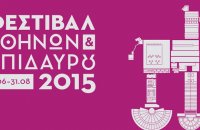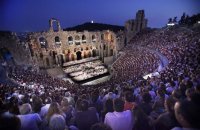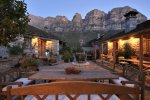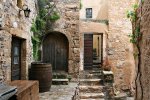


1955-2015: The Athens and Epidaurus Festival is celebrating its sixtieth of many creative years as a living entity which converses with society and continues to be active while at the same time undergoing change.
Theater at the Athens Festival 2015
For four decades, the Athens Festival was identified with the Odeon of Herodes Atticus. Nine years ago, a new chapter for the art of the theatre began, as the Festival expanded to include other venues, since the exquisite Roman theatre below the Acropolis imposed de facto restrictions and conditions to contemporary endeavours.
This year, the heart of the theatrical performances is beating at Peiraios 260, while at the same time other spectacles will be held at the Odeon of Herodes Atticus, at Aristotle’s Lyceum and other venues in the city. The theatre has a dynamic presence this year, with important foreign invitees as well as Greek productions by established and younger artists. Directors and theatre companies of international acclaim, such as Romeo Castellucci with Societas Raffaello Sanzio and Thomas Ostermeier with Schaubühne, whom we were first introduced to by the Athens Festival, are coming back with new works. Companies such as She She Pop from Berlin, Young Jean Lee’s Theatre from New York, South Africa’s Baxter Theatre, France’s François Tanguy and David Mambouch are appearing for the first time, while the New Riga Theatre from Latvia will be presenting the Greek premiere of a Russian play.
At the same time, the Festival remains open to the unforeseen, placing emphasis on original creation, and commissioning works from Greek theatre companies, with both Greek and foreign directors. Despite the dire financial situation, an effort has been made to represent as many tendencies as possible. Approaches to ancient Greek tragedy (which are taking place not only at Epidaurus, but also at indoor venues in Athens); new interpretations of European classics; new Greek plays; postdramatic performances of “devised” theatre; and street theatre. Providing a podium for young artists is one of the Festival’s main prerequisites: five directors are participating for the first time, while others are testing themselves once more in Athens, at the Epidaurus Festival and at Little Epidaurus.
Pride of place in this year’s edition is held by women: women directors, women playwrights and women actors. At the same time, the links between the Festival and the big issues of society dictated the inclusion of topics such as the homeless, refugees and immigrants, while the Caravan will come to the audience in the city. Diverse themes and different stage interpretations combine to produce a kaleidoscope of ideas, emotions and aspects of the world. At the Epidaurus Festival, important artists will tackle ancient drama, while the Greco-Japanese co-production of Homer’s Nekyia by the N Theatre will stand as a bridge between the two civilizations.
Τhe following performances at the Ancient Theatre of Epidaurus will be presented in Greek with Εnglish surtitles:
3 - 4.7 National Theatre of Greece – Sotiris Chatzakis “The Trojan Women” by EURIPIDES
10 - 11.7 Yiannis Kakleas “The Acharnians” by ARISTOPHANES
17 - 18.7 Neos Kosmos Theatre – Vangelis Theodoropoulos «Ajax» by SOPHOCLES
31.7 & 1.8 National Theatre of Greece – Giannis Bezos “The Ecclesiazusae” (Assemblywomen) by ARISTOPHANES
14 & 15.8 Vassilis Papavassiliou – “The Clouds” by ARISTOPHANES
28 - 29.8 Horos Theatre Company – Simos Kakalas “Orestes” by EURIPIDES
Whereas the 24 - 25.7 Japanese Noh Theatre– Michael Marmarinos “Nekyia” performance, which is based on the Book 11 of Homer’s Odyssey, will be presented in Japanese with Greek & English surtitles.
Music at the Athens Festival 2015
The Athens Festival has always been inextricably linked with music. Its audience eagrly awaits the musical notes, sounds and songs that will provide the soundtrack their summer evenings. Besides the Odeon of Herodes Atticus, a Festival staple, this year the Festival’s music will also spread to the Megaron, the Athens Concert Hall, to Peiraios 260 and to the Little Theatre of Ancient Epidaurus.
The Odeon of Herodes Atticus, as is tradition, will host the performances of the Greek National Opera (Puccini’s Tosca, conducted by Loukas Karytinos, and Bizet’s Carmen, conducted by Myron Michailidis), as well as performances of the Athens State Orchestra. Also noteworthy is a tribute to Mikis Theodorakis, to celebrate his 90th birthday: The Athens State Orchestra will perform Axion Esti, and a choir from distant Brittany will be performing the magnificent Canto General. Classical music, in its many different versions, will be honoured this year, showcasing new artists and interesting works: Salome, a baroque drama by two talented artists, Nikos Karathanos and Markellos Chryssikopoulos; the opera Leonce and Lena with music by Kornilios Selamsis and a libretto by Yannis Asteris; and, finally, two dramatic works by Giorgos Kouroupos, which will be presented in collaboration with the Armonia Atenea. Also, Stavros Gasparatos will bring a truly innovative performance to this year’s Festival, while the Armonia Atenea will surprise us once again by presenting the much-loved classic Kiss Me, Kate. Adam Cohen, son of the legendary Leonard Cohen, will bring more contemporary sounds to the Odeon of Herodes Atticus, while Stamatis Kraounakis and Lina Nikolakopoulou will put on a Mediterranean celebration based on Life and Times by Dario Fo.
This year, Greek music will be represented at the romantic little theatre of Ancient Epidaurus, where Nena Venetsanou will present songs inspired by Greek poetry, and Dimitra Galani, accompanied by a quartet of excellent musicians, will take us on a musical journey to the East and West. Finally, a unique meeting of two leading musicians will take place this year at Peiraios 260: Stavros Xarhakos will set Yannis Ritsos’ Moonlight Sonata to music and Marinella will interpret it
Dance at the Athens Festival 2015
As it has done every year for the past decade, the Athens Festival puts up bridges that link the international and the Greek dance scene. Its programming is centred on the viewer and stays away from outdated stereotypes regarding the dance spectacle by inviting important artists who are currently shaping the history of this art form, by displaying an eclectic spirit and by being steadily focused on fostering new creative work. This year, for example, different generations of Greek choreographers tackle the small dance form, solos or duets, often performed by themselves. These explorations may underscore an introspective mood or, alternatively, a dialogue between the music and the environment of the stage. These quests are invariably marked by a focus on the raw material, which is none other than the dancer’s body and which refers to the principles of modernity.
Enjoy a unique summer journey to culture through the upcoming events of the Athens & Epidaurus Festival 2015.
Info and tickets at: Athens & Epidaurus Festival











